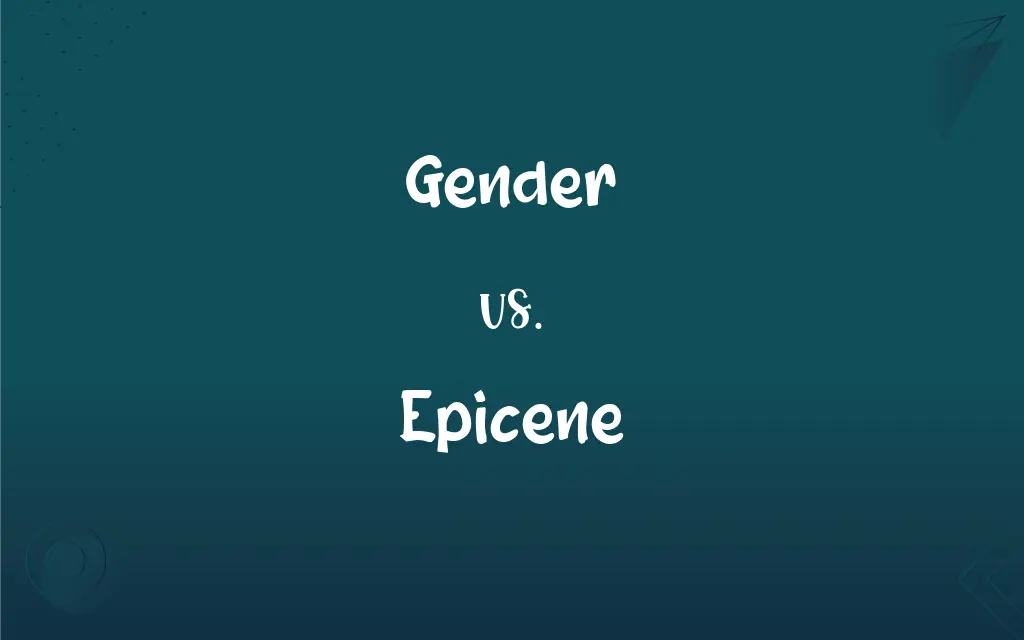Gender vs. Epicene: What's the Difference?
By Harlon Moss & Aimie Carlson || Updated on May 28, 2024
Gender refers to the social and cultural roles, behaviors, and attributes a society considers appropriate for men and women, while epicene describes a word or form that does not specify gender.

Key Differences
Gender is a complex construct encompassing social, cultural, and personal aspects related to being male, female, or non-binary. It influences how individuals identify and are perceived in society. Epicene, on the other hand, refers specifically to language and grammar, describing words or forms that are not gender-specific.
Gender roles are socially constructed norms dictating expected behaviors for men and women. These roles can vary widely across different cultures and time periods. Epicene language, however, aims to reduce gender bias in communication, ensuring that language remains neutral and inclusive.
In discourse, discussions about gender often involve topics like equality, rights, and social justice. Meanwhile, epicene language focuses on grammatical structures and vocabulary that promote gender neutrality, particularly in written and formal contexts.
Comparison Chart
Context
Social identity and roles
Language and grammar
Examples
Male, Female, Non-binary
Person, Sibling
ADVERTISEMENT
Relevance
Identity, behavior, social norms
Language inclusivity
Application
Sociology, psychology, identity
Linguistics, writing, communication
Gender and Epicene Definitions
Gender
Personal identification as male, female, or non-binary.
She expressed her gender identity clearly.
Epicene
Terms applicable to any gender.
The word friend is epicene.
Gender
Social roles associated with being male or female.
Gender roles often dictate career choices in many cultures.
ADVERTISEMENT
Epicene
(Linguistics) Having only one form for both the male and the female
An epicene pronoun.
Gender
Females or males considered as a group
Students lined up with the genders in different lines.
Epicene
A word that is not gender-specific.
They is an epicene pronoun.
Gender
(grammar) A division of nouns and pronouns (and sometimes of other parts of speech) into masculine or feminine, and sometimes other categories like neuter or common, and animate or inanimate.
Epicene
Language forms that are neutral in gender.
Use epicene terms to be inclusive.
Gender
To beget; to engender.
Epicene
Grammatically non-gendered words.
Doctor can be considered epicene.
Gender
The fact of being classified as belonging to such a category
Agreement in gender, number, and case.
Epicene
Having male and female characteristics.
Gender
One's identity as female or male or as neither entirely female nor entirely male.
Epicene
Having no male or female characteristics.
Gender
To engender.
Epicene
One that is epicene.
Gender
(obsolete) Class; kind.
Epicene
(Linguistics) An epicene word.
Gender
Identification as a man, a woman, or something else, and association with a (social) role or set of behavioral and cultural traits, clothing, etc; a category to which a person belongs on this basis. Compare gender role, gender identity.
Epicene
(linguistics) Of or relating to a class of Greek and Latin nouns that may refer to males or females but have a fixed grammatical gender (feminine, masculine, neuter, etc.).
Gender
Senseid|en|grammar: voice}} (grammar) {{synonym of voice
Epicene
(linguistics) Of or relating to nouns or pronouns in any language that have a single form for male and female referents.
Gender
(hardware) The quality which distinguishes connectors, which may be male (fitting into another connector) and female (having another connector fit into it), or genderless/androgynous (capable of fitting together with another connector of the same type).
Epicene
(by extension) Indeterminate; mixed.
Gender
An Indonesian musical instrument resembling a xylophone, used in gamelan music.
Epicene
Of a man: effeminate.
Gender
(sociology) To assign a gender to (a person); to perceive as having a gender; to address using terms (pronouns, nouns, adjectives...) that express a certain gender.
Epicene
(linguistics) An epicene word; preceded by the: the epicene words of a language as a class.
Gender
(sociology) To perceive (a thing) as having characteristics associated with a certain gender, or as having been authored by someone of a certain gender.
Epicene
An effeminate man.
Gender
(archaic) To engender.
Epicene
Having unsuitable feminine qualities
Gender
To breed.
Epicene
Avoidance of gender-specific terms.
Chairperson is an epicene alternative.
Gender
Evoking indescribable feelings regarding gender.
This song is so gender.
Gender
Kind; sort.
Gender
To copulate; to breed.
Gender
Behavioral traits linked to masculinity or femininity.
Traditional gender traits are evolving.
FAQs
What is gender?
Gender refers to the social and cultural roles, behaviors, and attributes that a society considers appropriate for men, women, and non-binary individuals.
Can you give an example of an epicene word?
Yes, "they" is an example of an epicene pronoun.
How is epicene language useful?
Epicene language promotes inclusivity and avoids gender bias in communication.
What are gender roles?
Gender roles are societal expectations about behaviors and activities deemed appropriate for men and women.
Why is gender important?
Gender influences personal identity, social interactions, and access to resources and opportunities.
What does epicene mean?
Epicene describes words or grammatical forms that are not gender-specific, used to refer to any gender.
Is "teacher" an epicene word?
Yes, "teacher" does not specify gender and is considered epicene.
What are some common epicene terms?
Words like "person," "individual," "doctor," and "sibling" are common epicene terms.
Can a name be epicene?
Yes, some names like "Jordan" or "Taylor" can be considered epicene as they are used for any gender.
What is the impact of gender roles on society?
Gender roles can influence career choices, personal relationships, and societal expectations.
How does gender affect communication?
Gender can influence communication styles, with societal norms often dictating different expectations for men and women.
Can occupations be described using epicene terms?
Yes, occupations like "doctor," "nurse," or "lawyer" can be referred to using epicene language.
What are epicene pronouns?
Pronouns like "they" or "ze" that do not specify gender are epicene pronouns.
How do gender roles change over time?
Gender roles evolve with cultural shifts and societal changes, reflecting new understandings of gender.
Why do some people prefer epicene pronouns?
Epicene pronouns are preferred for their inclusivity and respect for individuals' gender identities.
What is non-binary gender?
Non-binary is a gender identity that does not fit within the traditional categories of male or female.
Are there languages without gender-specific terms?
Yes, some languages like Turkish and Finnish use primarily epicene terms.
What is the purpose of using epicene language?
The purpose is to foster inclusivity and avoid reinforcing gender stereotypes in communication.
About Author
Written by
Harlon MossHarlon is a seasoned quality moderator and accomplished content writer for Difference Wiki. An alumnus of the prestigious University of California, he earned his degree in Computer Science. Leveraging his academic background, Harlon brings a meticulous and informed perspective to his work, ensuring content accuracy and excellence.
Co-written by
Aimie CarlsonAimie Carlson, holding a master's degree in English literature, is a fervent English language enthusiast. She lends her writing talents to Difference Wiki, a prominent website that specializes in comparisons, offering readers insightful analyses that both captivate and inform.
































































